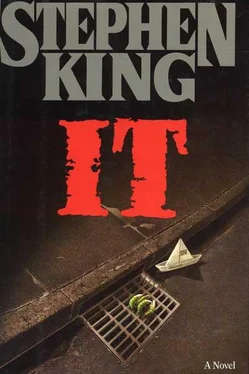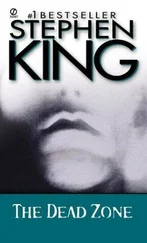Stephen King - It
Здесь есть возможность читать онлайн «Stephen King - It» весь текст электронной книги совершенно бесплатно (целиком полную версию без сокращений). В некоторых случаях можно слушать аудио, скачать через торрент в формате fb2 и присутствует краткое содержание. Год выпуска: 1986, Жанр: Ужасы и Мистика, на английском языке. Описание произведения, (предисловие) а так же отзывы посетителей доступны на портале библиотеки ЛибКат.
- Название:It
- Автор:
- Жанр:
- Год:1986
- ISBN:нет данных
- Рейтинг книги:4.33 / 5. Голосов: 3
-
Избранное:Добавить в избранное
- Отзывы:
-
Ваша оценка:
- 80
- 1
- 2
- 3
- 4
- 5
It: краткое содержание, описание и аннотация
Предлагаем к чтению аннотацию, описание, краткое содержание или предисловие (зависит от того, что написал сам автор книги «It»). Если вы не нашли необходимую информацию о книге — напишите в комментариях, мы постараемся отыскать её.
It — читать онлайн бесплатно полную книгу (весь текст) целиком
Ниже представлен текст книги, разбитый по страницам. Система сохранения места последней прочитанной страницы, позволяет с удобством читать онлайн бесплатно книгу «It», без необходимости каждый раз заново искать на чём Вы остановились. Поставьте закладку, и сможете в любой момент перейти на страницу, на которой закончили чтение.
Интервал:
Закладка:
She was pulling her shorts up again when she heard approaching footsteps from the dump. All she could see through the bushes were flashes of blue denim and the faded plaid of a school-shirt. It was Patrick. She ducked down, waiting for him to pass by toward Kansas Street. She was more sanguine about her position here. The cover was good, she no longer had to pee, and Patrick was off in his own cuckoo world. When he was gone she would double back and head for the clubhouse.
But Patrick didn’t pass by. He stopped on the path almost directly opposite her and stood looking at the rusting Amana refrigerator.
Beverly could observe Patrick along a natural sight-line in the bushes without too much chance of being seen. Now that she was relieved, she found she was curious again-and if Patrick did happen to see her, she felt certain she could outrun him. He wasn’t as fat as Ben, but he was podgy. She pulled the Bullseye out of her back pocket, however, and put half a dozen steel pellets in the breast pocket of her old Ship “n Shore. Crazy or not, a good one to the knee might discourage the likes of Patrick Hockstetter in a hurry.
She remembered the refrigerator well enough now. There were lots of discarded fridges at the dump, but it suddenly occurred to her that this was the only one she’d seen which Mandy Fazio hadn’t disarmed by either tearing out the latching mechanism with pliers or simply removing the door altogether.
Patrick began to hum and sway back and forth in front of the rusty old refrigerator, and Beverly felt a fresh chill course through her. He was like a guy in a horror movie trying to summon a dead body out of a crypt.
What’s he up to?
But if she had known that, or what was going to happen when Patrick finished his private ritual and opened the dead Amana’s rusty door, she would have run away as fast as she could.
5
No one-not even Mike Hanlon-had the slightest idea of how crazy Patrick Hockstetter really was. He was twelve, the son of a paint salesman. His mother was a devout Catholic who would die of breast cancer in 1962, four years after Patrick was consumed by the dark entity which existed in and below Derry. Although his IQ tested out as low normal, Patrick had already repeated two grades, the first and third. He was taking summer classes this year so he would not have to repeat the fifth as well. His teachers found him an apathetic student (this several of them noted on the bare six lines of the Derry Elementary School’s report cards reserved for TEACHER’s COMMENTS) and a rather disturbing one as well (which none noted-their feelings were too vague, too diffuse, to be expressed in sixty lines, let alone six). If he had been born ten years later, a guidance counsellor might have steered him toward a child psychologist who might (or might not; Patrick was far more clever than his lackluster IQ results indicated) have realized the frightening depths behind that slack and pallid moonface.
He was a sociopath, and perhaps, by that hot July in 1958, he had become a full-fledged psychopath. He could not remember a time when he had believed that other people-any other living creatures, for that matter-were “real.” He believed himself to be an actual creature, probably the only one in the universe, but was by no means convinced that his actuality made him “real.” He had no sense of hurting, exactly, and no real sense of being hurt (his indifference to being struck in the mouth by Henry in the dump was a case in point). But while he found reality a totally meaningless concept, he understood the concept of “rules” perfectly. And while all of his teachers had found him odd (both Mrs Douglas, his fifth-grade teacher, and Mrs Weems, who had had Patrick in the third grade, knew about the pencil-box full of flies, and while neither of them totally ignored the implications, each had between twenty and twenty-eight other students, each with problems of his or her own), none of them had serious disciplinary problems with him. He might turn in test papers that were utterly blank-or blank except for a large, decorative question-mark-and Mrs Douglas had discovered it was best to keep him away from the girls because of his Roman hands and Russian fingers, but he was quiet, so quiet that there were times when he might have been taken for a big lump of clay that had been crudely fashioned to look like a boy. It was easy to ignore a Patrick, who failed quietly, when you had to cope with boys like Henry Bowers and Victor Criss, who were actively disruptive and insolent, boys who would steal milk-money or happily deface school property if given a chance, and girls like the unfortunately named Elizabeth Taylor, who was epileptic and whose few poor brain-cells worked only sporadically and who had to be discouraged from pulling her dresses up in the playyard to show off a new pan: of panties. In other words, Derry Elementary School was the typical confused educational carnival, a circus with so many rings that Pennywise himself might have gone unnoticed. Certainly none of Patrick’s teachers (or his parents, for that matter) suspected that, when he was five, Patrick had murdered his baby brother Avery.
Patrick had not liked it when his mother brought Avery home from the hospital. He didn’t care (or so he at first told himself) if his parents had two kids, five kids, or five dozen kids, as long as the kid or kids didn’t alter his own schedule. But he found that Avery did. Meals came late. The baby cried in the night and woke him up. It seemed that his parents were always hanging over its crib, and often when he tried to get their attention he found that he could not. For one of the few times in his life, Patrick became frightened. It occurred to him that if his parents had brought him, Patrick, home from the hospital, and if he was “real,” then Avery might be “real,” too. It might even be that, when Avery got big enough to walk and talk, to bring in his father’s copy of the Derry News from the front step and to hand his mother the bowls when she baked bread, they might decide to get rid of Patrick altogether. It was not that he feared they loved Avery more (although it was obvious to Patrick that they did love him more, and in this case his judgment was probably correct). What he cared about was (1) the rules that were being broken or had changed since Avery’s arrival, (2) Avery’s possible reality, and (3) the possibility that they might throw him out in favor of Avery.
Patrick went into Avery’s room one afternoon around two-thirty, shortly after the school-bus had dropped him off from his afternoon kindergarten session. It was January. Outside, snow was beginning to fall. A powerful wind boomed across McCarron Park and rattled the frosty upstairs storm windows. His mother was napping in her bedroom; Avery had been fussy all the previous night. His father was at work. Avery was sleeping on his stomach, his head turned to one side.
Patrick, his moonface expressionless, turned Avery’s head so his face was pressed directly into the pillow. Avery made a snuffling noise and turned his head back to the side. Patrick observed this, and stood thinking about it while the snow melted off his yellow boots and puddled on the floor. Perhaps five minutes passed (quick thinking was not Patrick’s specialty), and then he turned Avery’s face into the pillow again and held it there for a moment. Avery stirred under his hand, struggling. But his struggles were weak. Patrick let go. Avery turned his head to the side again, made one snorting little cry, and then went on sleeping. The wind gusted, rattling the windows. Patrick waited to see if the one little cry would awaken his mother. It didn’t.
Now he felt swept by a great excitement. The world seemed to stand out in front of him clearly for the first time. His emotional equipment was severely defective, and in those few moments he felt as a totally color-blind person might feel if given a shot which enabled him to perceive colors for a short time… or as a junkie who has just fixed feels as the smack rockets his brain into orbit. This was a new thing. He had not suspected it existed.
Читать дальшеИнтервал:
Закладка:
Похожие книги на «It»
Представляем Вашему вниманию похожие книги на «It» списком для выбора. Мы отобрали схожую по названию и смыслу литературу в надежде предоставить читателям больше вариантов отыскать новые, интересные, ещё непрочитанные произведения.
Обсуждение, отзывы о книге «It» и просто собственные мнения читателей. Оставьте ваши комментарии, напишите, что Вы думаете о произведении, его смысле или главных героях. Укажите что конкретно понравилось, а что нет, и почему Вы так считаете.











